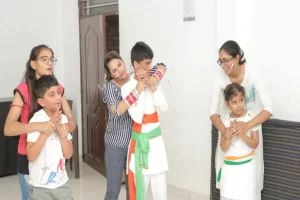
Source: schoolofhealthcare
Dyslexia Dyscalculia Dysgraphia Dyspraxia are distinctive growing disorders that each affect diverse cognitive and motor skills. Comprehending their dissimilarities is critical for operative help and intervention.
- Dyslexia: This primarily impacts reading skills. Persons with dyslexia may suffer with word identification, decoding words, and comprehending written text. It’s not just about reading words rearward, as is commonly thought, but includes a deeper struggle with handling language.
- Dyscalculia: This affects mathematical abilities. People with dyscalculia often find it difficult to understand numeric concepts, make calculations, and remember mathematics facts. Unlike simple math anxiety, dyscalculia includes an essential difficulty in creating a sense of numbers and math processes.
- Dysgraphia: This is characterized by difficulties with writing. It can be visible as problems with handwriting, establishing thoughts on paper, and spelling. Unlike typical writing difficulties, dysgraphia makes the performance of writing challenging and often rambling.
- Dyspraxia: In the traditional sense it cannot stated as learning difficulty, dyspraxia is a condition that affects motor skill development. This may ultimately affect learning, as persons with dyspraxia may suffer from responsibilities needing coordination, such as writing or using school gear.
In each of these circumstances, Dyslexia Dyscalculia Dysgraphia Dyspraxia have their distinctive challenges and need tailored methods for management and help. Comprehending their separate individualities is the initial step in providing operative assistance to those who suffer from these problems.
What are the Strategies to help Dyslexia?
To support students with this learning difficulty and improve their condition, Strategies to help Dyslexia are essential in educational settings.
Here are some effective Strategies to help Dyslexia:
Multi-sensory Education
This strategy involves engaging multiple senses at the same time like seeing, hearing, and movement or touch. This method combines visual aids with verbal instructions and hands-on activities to enhance writing skills and reading.
Clear Instructions
With easy and clear instructions, complex tasks can be simplified. Smaller instructions are targeted can help students with Dyslexia understand tasks better and manage them effectively
Assistive Technology
Various tools like converting text into speech and vice-versa are pretty helpful and greatly support students with Dyslexia. Such technologies make reading and writing manageable and interesting.
Drilling Sight Words
To improve reading fluency for students with Dyslexia, regular practice of common words can help. The repetition of certain words will them familiar.
Individualized Education Plans (IEPs)
This personalized approach ensures that learning strategies line up with the student’s challenges. IEP is a method that tailors education according to a student’s specific needs which significantly benefits individuals with Dyslexia.
Silent Reading
Silent reading improves focus and helps in comprehending text without the added pressure of reading out loud, which can be challenging for them.
Flexible Assessment
Oral presentations and visual projects can act as alternatives to assess knowledge and can be more accommodating for students with Dyslexia.
Implementing these strategies to help Dyslexia can make a significant difference in the learning experience and academic success of students with this condition. Each strategy addresses specific aspects of Dyslexia, from reading and writing challenges to comprehension difficulties, providing a comprehensive support system.
For more details about our Special Education Course, Call / Whatsapp on +919321024137 / +919869866277.
Our informative Special Education Course brochure, Available Here.

Source: wordunited
Is Math disorder Dyscalculia?
A specific learning disability that affects the person’s aptitude to understand numbers and learn math concepts easily is known as the math disorder Dyscalculia. Individuals with Dyscalculia may scuffle with basic arithmetic, understanding time, other math-related tasks, and using money.
How Dyscalculia Impacts Learning Maths:
- Memory Challenges: A significant hurdle that Individuals face is in remembering multiplication tables and math concepts.
- Conceptual Understanding: Dyscalculia affects the understanding of basic number concepts and relationships, leading to difficulties applying mathematical principles.
- Difficulties in Mathematical operations: Individuals with Dyscalculia are unable to perform basic maths calculations like addition, subtraction, or multiplication.
- Temporal Reasoning and Spatial: Dyscalculia also affects the simple time reasoning of a person and spatial relationships.
- Impacts on Real-life Situations: Real-life tasks of individuals with dyscalculia become difficult like budgeting or measuring.
With tailored strategies and support, individuals with Dyscalculia can improve their math skills and overcome some of the challenges associated with this condition. That’s why providing appropriate support and interventions on time to individuals with Dyscalculia is central for educators and parents.
Call / Whatsapp on +919321024137 / +919869866277.
Our informative Special Education Course brochure, Available Here.
What are Dysgraphia Intervention Strategies?
A learning disability that impacts the writing skills of a person is known as Dysgraphia this disability creates significant academic challenges for students. It seems to co-occur with other learning differences like dyslexia dyscalculia dyspraxia, creating a unique set of challenges.
Dysgraphia intervention strategies are proven to be helpful for individuals who encounter dysgraphia challenges. Let’s understand what is Dysgraphia, before digging into the dysgraphia intervention strategies. It is a neurological disorder or disability that primarily affects the handwriting and fine motor skills of an individual.
Implementing targeted Dysgraphia Intervention strategies can considerably improve the writing experience for those affected with dysgraphia. Mostly it seems to be connected with other learning disabilities such as dyslexia dyscalculia dyspraxia, making it a multi-layered issue to address.
Here is an overlook of dysgraphia intervention strategies:
Use Assistive Technology Tools
- Speech-to-text software
- Word processors with spell check and grammar suggestions
- Audio recorders for capturing ideas before writing
Break Down Writing Tasks into Smaller Components
- Focus on brainstorming before writing
- Outline the writing task to make it more manageable
- Emphasize the process over the final product
Change the Writing Tool Used
- Different types of pens, pencils, and paper can be used to see the changes.
- For better grip and control ergonomic writing instruments can be used.
- Consider using a keyboard or tablet for typing.
Fine Motor Control Exercises
- Engage in activities like threading beads or playing with clay to improve dexterity
- Practice handwriting exercises regularly
- Use hand-strengthening tools like stress balls or grip strengthens
Use of Other Multi-Sensory Options for Expression
- Encourage verbal explanations or storytelling
- Use visual aids like diagrams and charts
- Incorporate physical activities that relate to the writing topic
Create, Print, and Provide Graphic Organizers
- Use visual maps to organize thoughts and ideas
- Provide templates for story structure or essay formats
- Utilize timeline or sequencing charts for historical or process writing
Dysgraphia involvement approaches are critical in supporting persons with dysgraphia to enhance their writing skills. By using assistive tools, flouting down writing tasks, varying writing instruments, fetching in fine motor control training, applying multi-sensory expression approaches, and providing graphic managers, persons with dysgraphia can find writing more available and less stressful.
Remember, each individual’s needs are unique, and it’s essential to tailor these strategies to fit their specific requirements. With patience and the right support, improvement is not just possible; it’s inevitable.
Call / Whatsapp on +919321024137 / +919869866277. For better assistance,
Our informative Special Education Course brochure, Available Here.

Source: browngirlmagazine
What are different Dyspraxia Therapies?
Dyspraxia is considered a cousin of – Dyslexia Dyscalculia Dysgraphia mostly commonly. As it presents inimitable trials in learning and coordination. However, Dyspraxia therapies come up as a saviour and offer a beacon of hope in providing operative strategies for managing and overcoming Dyspraxia.
Here are some promising Dyspraxia therapies:
Occupational Therapy
Personalized Approach
This technique focuses on the daily living tasks it involves providing tailored support to individuals. This therapy is considered to be a foundation in Dyspraxia therapies.
Sensory Integration
To help individuals process sensory information more effectively, Therapists often unite sensory integration techniques.
Modified Tools and Strategies
Occupational therapists make use of tools like pencil grips and specialized computer tools to provide aid in academic performance and daily tasks of an individual.
Speech and Language Therapy
Communication Enhancement
Dyspraxia affects speech ability to a great extent. To improve the clarity of speech and language understanding, Speech and language therapies are beneficial.
Personalized Exercises
Therapists practice exercises that are personalized to individual needs, focusing on breath control, articulation, and rhythm of speech.
Perceptual Motor Training
Skill Development
To target the development of coordination, balance, and fine motor skills, this aspect of Dyspraxia therapies is used.
Varied Activities
Perceptual activities like eye coordination or hand coordination helps to manage complex tasks with ease as it improves movements and the motor skills of a person.
Equine Therapy for Dyspraxia
Unique Interaction
This involves interactions with horses to improve balance, motor skills, and emotional well-being. Equine therapy is based on a novel approach in the spectrum of Dyspraxia therapies.
Holistic Development
The rhythm and movement of horse riding have been shown to enhance coordination, posture, and strength in individuals with Dyspraxia.
Active Play
Engaging and Fun
It encourages physical movement and coordination in a fun, low-pressure environment. Active play is an integral part of therapy for Dyspraxia.
Social Skills
Active play fosters social interaction and teamwork which improves motor skills.
Dyspraxia therapies encircle strategies for Dyslexia Dyscalculia Dysgraphia as well, offering a multifaceted approach to address conditions.
Occupational therapies to Equine therapies all are extremely beneficial methods that play a vital role in aiding skill development and enhancing the quality of life. Implementation of these therapies can significantly benefit individuals steering the complexities of Dyspraxia.
Call / Whatsapp on +919321024137 / +919869866277. For more details about our Special Education Course,
Our informative Special Education Course brochure, Available Here.

Source: brainbalance
How to enroll for Specific Learning Difficulties Course?
A specialized set of skills and understanding is required to navigate the educational needs of individuals with learning difficulties. Vidhyanidhi Education Society offers the Specific Learning Difficulties Course that stands as a beacon of hope for educators, parents, and anyone keen on making a significant difference in this arena. The focus of this course on Dyslexia Dyscalculia Dysgraphia equips learners with the necessary tools to recognize, understand, and provide effective support to individuals.
Enrollment Simplified: Your Pathway to Expertise
The Enrollment process of the Specific Learning Difficulties Course is designed to be accessible from anywhere in the world. Vidhyanidhi Education Society has streamlined its admission procedure, ensuring that starting your journey towards specialized knowledge is only a few clicks away. This ease of access does not compromise the quality of education trainees receive.
Unveiling the Benefits: Why Choose This Course?
The Specific Learning Difficulties Course from Vidhyanidhi Education Society comes with a plethora of benefits designed to enhance the learning experience and prepare aspiring individuals educational world.
These include:
Widely Accepted Certification
The certificate received after the course is recognized globally, paving the way for countless opportunities in education and support roles.
Easy-to-Do Online Course
Complex concepts can be grasped easily by learners because the course content is designed engaging and compelling.
MCQ-Based Online Assessment
The evaluation process is based on multiple-choice questions eliminating the stress of long answers, making assessments focused and interesting.
Letter of Internship
To bridge the gap between theoretical knowledge and real-world application, Trainees are provided with a letter of internship to work as interns and gain invaluable practical experience.
Certificate Clarity
The certificate does not mention the “Online Mode of study,” ensuring its acceptance and validity in various educational and professional settings.
Reasonable Fee and Simple Course Content
The affordable course fee on the simplified course content is icing on the cake, making specialized education accessible to a wider audience.
Global Accessibility
Ensuring that geographical boundaries do not limit the educational aspirations this course is available globally through its Online/Distance mode.
Experienced Mentoring
This course enriches the learning journey with real-life insights and solutions provided by mentors who bring years of experience to the table.
Expertly Developed Course Material
Ensuring that you receive up-to-date and effective training, the course content is meticulously crafted and reviewed by licensed practitioners,
To acquire specialized skills in supporting individuals with Dyslexia Dyscalculia Dysgraphia, The Specific Learning Difficulties Course from Vidhyanidhi Education Society offers a unique opportunity that not only makes enrollment easy but also ensures that trainees are well-trained with knowledge, and globally recognized certification and practical experience,
For anyone looking to make a meaningful impact in the field of special education, This course marks an essential step. Enroll today and start your journey towards becoming an integral part of the solution for individuals facing specific learning difficulties.
Join us & transform lives with SEN courses!
For more details about our Special Education Course, Call / WhatsApp on +919321024137 / +919869866277.
Our informative Special Education Course brochure, Available Here.
How are Dyslexia Dyscalculia Dysgraphia Dyspraxia different?
FAQs
What are the 3 types of Learning Difficulties?
The three types of learning difficulties are Dyslexia Dyscalculia Dysgraphia associated with reading, writing and math.
Are Online Learning Disability Courses available?
Yes, online courses for learning disabilities are available globally offering training and resources for various learning difficulties.
Is Dyspraxia a learning difficulty?
Dyspraxia not a learning difficulty it affects learning due to motor skill challenges but is distinct from learning disabilities like dyslexia, dysgraphia, or dyscalculia.



